Original Source: Washington Examiner
By: Paul Bedard
A key group in the war on sexual violence has named the Justice Department to its “Dirty Dozen” list for failing to enforce existing obscenity law which they claims fosters pornography.
Coming just days after a new report showed that porn use among teens and adults is on the rise, the National Center of Sexual Exploitation called Justice a “top facilitator of sexual exploitation due to years of the DOJ’s failure to enforce existing obscenity law.”
The group said that by looking the other way on the distribution of porn on the internet, TV and hotels, Justice has fostered its spread throughout culture.
“While the enforcers of the law have refused to do their job, pornography has become pervasive in American society. Websites, cable companies, hotels, and others openly sell pornography,” said Dawn Hawkins, executive director of the National Center on Sexual Exploitation.
“Pornography drives the demand for sex trafficking and prostitution, and has been linked to increased rates of sexual aggression and violence. The DOJ must realize that their inaction has consequences, and that sexually exploitive material like pornography cannot be tolerated in a country that espouses principles of equality and human rights,” she added.
Secrets last week reported the surge in porn use in part because people believe it is safer than sex.
The report also showed that teens no longer find porn immoral.
“The U.S. Department of Justice has abandoned its post in the fight for freedom from sexual exploitation and violence,” said Hawkins. “Despite being the primary federal criminal investigation and enforcement agency, the DOJ refuses to enforce existing federal obscenity laws against pornography even though these laws have been upheld by U.S. Courts and have been previously enforced. Federal law prohibits distribution of obscene, adult pornography on the Internet, on cable/satellite TV, on hotel/motel TV, in retail shops, through the mail, and by common carrier. The U.S. Supreme Court has repeatedly upheld obscenity laws against First Amendment challenges because obscenity is not protected speech.”


